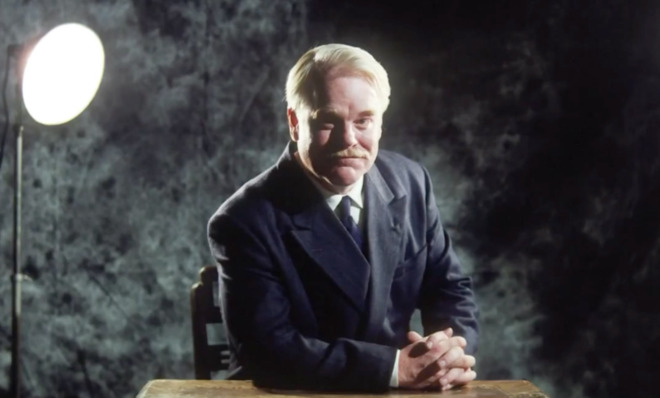Philip Seymour Hoffman: An extraordinary, irreplaceable actor
The incredibly talented actor, who died on Sunday at age 46, leaves behind a legacy of unforgettable performances


A free daily email with the biggest news stories of the day – and the best features from TheWeek.com
You are now subscribed
Your newsletter sign-up was successful
It's the rare actor — maybe even the singular actor — who could elevate any movie simply by appearing in it. Philip Seymour Hoffman was that actor.
The difficulty of writing a tribute to Hoffman, who died yesterday at age 46, is a testament to his chameleon-like range as an actor. How can you summarize the career of a man who, in film after film, demonstrated his talents with a confidence and clarity that eludes even his greatest contemporaries? How could anyone pick one, or five, or 15 favorite Philip Seymour Hoffman performances when each of his performances carried so much singular complexity?
That was the magic of Philip Seymour Hoffman. You could watch him as a self-destructive cult leader or a sleazy tabloid journalist or an icy villain who shrugs off torture the way a normal person would shrug off a swatted fly. You could see him elevate a dumb comedy like Along Came Polly in 2004, and watch him win a Best Actor Oscar for delivering a complex, humane channeling of a cultural figure like Truman Capote in 2005 — the rare cinematic embodiment of a real-life person that actually deserved all the hype it got.
The Week
Escape your echo chamber. Get the facts behind the news, plus analysis from multiple perspectives.

Sign up for The Week's Free Newsletters
From our morning news briefing to a weekly Good News Newsletter, get the best of The Week delivered directly to your inbox.
From our morning news briefing to a weekly Good News Newsletter, get the best of The Week delivered directly to your inbox.
But for all the range he showed, it wasn't that Hoffman disappeared into his roles; he was far too magnetic for that. It was Hoffman's unmistakable complexity and intelligence, which allowed him to channel an entirely different aspect of himself for every performance. The sense of overpowering loss among cinephiles is largely a result of Hoffman's amazing body of work, and the decades of incredible work he still had ahead of him. (I'm particularly hopeful that Showtime will broadcast the pilot episode for Happyish, in which Hoffman was set to star — if only so we can imagine what might have been.)
In the end, the best tribute we can pay to an actor is to admire his or her body of work — and with that in mind, I would encourage you to seek out several of Hoffman's unjustly overlooked performances. (You'd be safe going to his IMDB page and choosing a movie at random, but if you're looking for a little guidance: Try The 25th Hour, where his quiet turn as a depressed schoolteacher leaves more of an impression than Edward Norton's impassioned scenery-chewing, or Hard Eight, when he takes a one-note character named "Young Craps Player" and delivers an indelible performance.)
I'll never be able to choose which of Hoffman's performances was "best," but I can tell you which of his performances meant the most to me. 2008's Synecdoche, New York was a daring movie: Big, operatic, and deeply strange, aiming for the kind of raw emotional impact that's more likely than not to fall totally flat. Hoffman played a theater director whose obsession with creating a magnum opus is so all-consuming that it eventually takes over reality itself. Hoffman commits to the difficult role so completely that Synecdoche, New York achieves the rarest of cinematic accomplishments: Transcendence.
I don't think I'll be able to watch Synecdoche, New York again anytime soon; it broke my heart the first time I saw it, and its poignancy will be magnified exponentially now that Philip Seymour Hoffman is gone. "None of those people is an extra," says Hoffman's theater director in one of his small epiphanies. "They're all the leads of their own stories. They have to be given their due."
A free daily email with the biggest news stories of the day – and the best features from TheWeek.com
The great triumph of Philip Seymour Hoffman's career was his unfailing commitment to telling those stories, and the great tragedy is that we won't have the stories he would have told in the decades to come.
Scott Meslow is the entertainment editor for TheWeek.com. He has written about film and television at publications including The Atlantic, POLITICO Magazine, and Vulture.
